This article was co-authored by Trudi Griffin, LPC, MS. Trudi Griffin is a Licensed Professional Counselor in Wisconsin specializing in Addictions and Mental Health. She provides therapy to people who struggle with addictions, mental health, and trauma in community health settings and private practice. She received her MS in Clinical Mental Health Counseling from Marquette University in 2011.
There are 10 references cited in this article, which can be found at the bottom of the page.
This article has been viewed 24,759 times.
Agoraphobia is a mental health condition characterized by irrational fears about being in public places.[1] The condition causes afflicted individuals to avoid public places and remain trapped in their homes. Coping with your own agoraphobia involves facing up to the irrationality of the fearful thoughts it produces, and seeking help from others. Supporting someone suffering from agoraphobia requires an understanding of the condition, and a willingness to guide and soothe the person with agoraphobia through the situations which trigger their fear.
Steps
Coping With Your Own Agoraphobia
-
1Talk to someone you can trust about your fear. Panic caused by agoraphobia can seem overwhelming and impossible to control. If you are suffering from this condition, it is crucial that you let others in your life know, so that they can be understanding and provide support. Tell them about the situations which trigger your fear, and describe how it feels.[2]
-
2Seek help from a mental health professional. Phobias are very difficult to deal with on your own. Finding a counselor or therapist to help you deal with the symptoms and causes of your agoraphobia is essential. For more extreme cases your doctor may recommend cognitive behavioral therapy or medication to assist you in dealing with your condition.[3]Advertisement
-
3Try to stop avoidance behaviors. While it may be very unpleasant, you should do your best to regularly face the situations which trigger your fear and panic. In modern life, exposure to public places is inevitable, and the more you resist, the worse the consequences will be for your life.[4]
- Don't do it alone. Having a trusted friend or family member with you when you are on the bus, at the store, or in any other triggering situation can be a great help.
-
4Practice relaxation techniques. If you find yourself panicking in a public place, try to focus on controlling your breath instead of fixating on fearful or anxious thoughts. Breathing slowly and deeply will help naturally calm your body's physiological response to fear, reducing its severity. Close your eyes, count slowly to 10, and focus on breathing in through the mouth, and out through the nose. Visualize calming environments and images, and remind yourself that you are in no danger, and that the episode will pass.[5]
-
5Confront public places slowly and with guidance. Your therapist can help you explore "exposure therapy" in which you intentionally seek out situations which trigger your fear response. For a person with agoraphobia, this means confronting situations such as crowds, public places, or wide open space. This must be done slowly and gradually, and with great care, so that the fear and panic do not become overwhelming, putting you or others in danger. It is best to consult with your therapist before attempting exposure therapy.[6]
- It is important that, before you begin this type of treatment, you have worked on coping techniques with your therapist. Attempting exposure therapy without knowing a productive way to cope with the situation can cause you to become even more fearful.[7] Practice deep breathing, mindfulness, or other techniques your therapist might suggest.
- You and your therapist will work on a gradual approach. You might begin by looking at images of large crowds. Your therapist might have you gradually go further and further from your home, or go to places where you will be among a small number of people (maybe a small gathering at a friend's house) and work up to something like a crowded street festival or concert.[8]
- After each step, you will begin to see that the fear and anxiety are tolerable and will subside, and that the things you fear happening (like becoming trapped in the crowded space and unable to leave) generally do not actually happen.[9]
-
6Challenge irrational thoughts. Many of the anxious and fearful thoughts associated with agoraphobia are irrational, meaning that they are not based in fact. Understanding this, you can work to correct your thoughts by challenging them with evidence. [10] When you are in a situation which triggers your agoraphobia, ask yourself these questions:
- Do facts or evidence support my fearful thinking, or are they irrational? ("How often does someone actually get trampled while shopping at a crowded mall? Is this really likely to happen to me?")
- If a frightening or dangerous situation occurs, what steps could I take to remain safe? ("I can use my cellphone to call the authorities and take note of the exits and use them to leave the situation.")
- What would I say to another person with agoraphobia to comfort them in this situation? ("I would tell him to take a deep breath and visualize being somewhere calming.")
- Have I felt this way before while in a similar situation, and, if so, were my fears warranted? ("I was so anxious when we went to the amusement park and there were such huge crowds and I felt trapped — but no one got hurt and I was able to get to where I needed to go and easily leave when I wanted to.")
Supporting Someone Suffering from Agoraphobia
-
1Speak honestly with the person about their agoraphobia. Phobias are powerful, and it is often difficult for someone suffering from a phobia to identify that their fears are irrational, and disproportionate to their real danger. Be supportive, and encourage them to explain the feelings associated with their phobia. Ask them about any traumatic experiences they may have had in public spaces, and try to understand when and how their fears are triggered.[11]
-
2Emphasize a realistic perspective. Without shaming or condescending to the your loved one, explain that public places are not inherently dangerous. Remind them how crucial going out into the world is for leading a full and happy life. If they are worried about disasters, injuries or becoming lost, help them to come up with a plan to deal with such incidents, while reminding them how unlikely they are to occur.[12]
- Remember that phobias are not rational. Even if an agoraphobia sufferer understands intellectually that they are in no danger, it may be impossible for them to control how they respond. Be patient, and don't become impatient or angry.
- Avoid encouraging them to remove themselves from public places, so long as they are not in any real danger. If they begin to have a serious panic attack, however, you should calmly guide them to a place where they can feel safe.
-
3Show appropriate behavior in public places. It can be comforting and encouraging to someone suffering from agoraphobia to see that someone they know and trust is comfortable in a situation which is causing them distress. Maintain a positive, calm attitude, and go about your business as if nothing is wrong.[13]
- Encourage them to accompany you to public places often, especially during times when they will not be especially crowded or stressful. The more exposure they get to the source of their fear, the easier it will be for them to overcome it.
- Avoid drawing attention to your loved one, and allow them to explore the situation without interference. If they seem distressed or fearful, gently ask them how they're feeling, provide encouragement, and continue about your normal business.
-
4Encourage the sufferer of agoraphobia to speak with a therapist. Only a mental health professional can diagnose someone with a phobia. A counselor or therapist will know exactly what treatment options to pursue, including exposure therapy, cognitive behavioral therapy, and medication. If they are finding it difficult to get to their appointments because they are afraid to leave the house, offer to accompany them or give them a ride.
Recognizing the Symptoms of Agoraphobia
-
1Notice fear in public spaces. The most obvious symptom of agoraphobia is an intense fear or panic response from exposure to a public environment. If you experience such a response from two or more of the following situations, you may be suffering from agoraphobia:[14]
- Being on a bus, train, airplane, or other public transit method.
- Standing in a parking lot, a sports field, on a bridge, or in another wide-open space.
- Being in line, or in a large crowd.
- Going out of your home by yourself.
- Being in an enclosed, public space such as an office, store or movie theater.
-
2Monitor the extremity of the fear. While many are uncomfortable in public places, those suffering from agoraphobia display overwhelming, intense panic responses. These responses often manifest physically with symptoms such as:[15]
- Unusually difficult or quick breathing.
- Feeling detached or paralyzed.
- Rapid heartbeat.
- Feeling light-headed, or on the verge of passing out.
- Stomach or intestinal discomfort.
- Sweating.
- Urgent desires to escape.
- Nervous fidgeting.
-
3Recall traumatic experiences in public places. Those suffering from agoraphobia often have a history of painful, shocking or otherwise traumatic events involving crowds or public spaces. Being in a public space during a disaster, or becoming lost in a crowd or trapped in an unfamiliar place are all experiences which might contribute to agoraphobia.
- An individual need not have a traumatic history with public spaces to qualify as agoraphobic.
-
4Be aware of avoidance behaviors. Those suffering from a phobia will often go to great lengths to avoid exposing themselves to the source of their fear. For an agoraphobic person, this means a pronounced unwillingness to leave the home, even when it is necessary. They will often not be able to visit their friends or family, run simple errands, or participate in school or work activities.[16]
-
5Be aware of the impact and consequences of fear. True agoraphobia is extremely disruptive to an individual's life, since they may find themselves unable to perform ordinary tasks, like going to work or buying groceries. The resulting stress and anxiety can lead to other serious psychological disorders, such as depression, anxiety disorders, or drug or alcohol abuse.[17]
-
6Monitor the fear's persistence. Unlike ordinary fear, phobias persist over an extended period of time, from as short as six months, to an entire lifetime. Someone suffering from agoraphobia will consistently be afraid of public spaces and crowds, rather than only sometimes displaying fear.[18]
-
7Consult a mental health professional. Agoraphobia is a severe and debilitating psychological condition. If you or someone you know may be suffering from agoraphobia, then talking with a counselor, therapist or medical doctor is a crucial step in diagnosing and understanding the condition. Remember: only a medical professional can diagnose or treat agoraphobia.[19]
- If you're having trouble locating a therapist, talk to your doctor for a referral, or contact your medical insurance provider for assistance.
References
- ↑ https://www.nhs.uk/conditions/agoraphobia/
- ↑ https://www.mind.org.uk/information-support/types-of-mental-health-problems/phobias/types-of-phobia/
- ↑ https://my.clevelandclinic.org/health/diseases/15769-agoraphobia
- ↑ https://my.clevelandclinic.org/health/diseases/15769-agoraphobia
- ↑ https://www.betterhealth.vic.gov.au/health/conditionsandtreatments/agoraphobia
- ↑ https://www.nhs.uk/conditions/agoraphobia/treatment/
- ↑ https://www.apa.org/ptsd-guideline/patients-and-families/exposure-therapy
- ↑ https://www.div12.org/psychological-treatments/treatments/exposure-therapies-for-specific-phobias/
- ↑ https://www.div12.org/psychological-treatments/treatments/exposure-therapies-for-specific-phobias/
- ↑ http://www.helpguide.org/articles/anxiety/phobias-and-fears.htm
- ↑ https://my.clevelandclinic.org/health/diseases/15769-agoraphobia
- ↑ http://www.helpguide.org/articles/anxiety/phobias-and-fears.htm
- ↑ https://www.betterhealth.vic.gov.au/health/conditionsandtreatments/agoraphobia
- ↑ https://www.nhs.uk/mental-health/conditions/agoraphobia/symptoms/
- ↑ https://medlineplus.gov/ency/article/000923.htm
- ↑ https://www.nhs.uk/mental-health/conditions/agoraphobia/symptoms/
- ↑ https://medlineplus.gov/ency/article/000923.htm
- ↑ http://www.helpguide.org/articles/anxiety/phobias-and-fears.htm
- ↑ https://www.nhs.uk/conditions/agoraphobia/treatment/
About This Article
To treat agoraphobia, try focusing on breathing slowly and deeply whenever you feel anxious in public, which will help reduce the physical effects of your discomfort. You can also try to challenge any irrational thoughts by asking yourself if there's any evidence to support your fear and how someone else might act in your position. Additionally, consider talking to someone about your fear, such as a trusted friend or a counselor, as it can be very challenging to deal with on your own. Also, do your best not to avoid situations which trigger your anxiety, as avoidance will only make your symptoms worse in the long term. For more tips from our Counselor co-author, including how to support a friend or family member suffering from agoraphobia, read on!
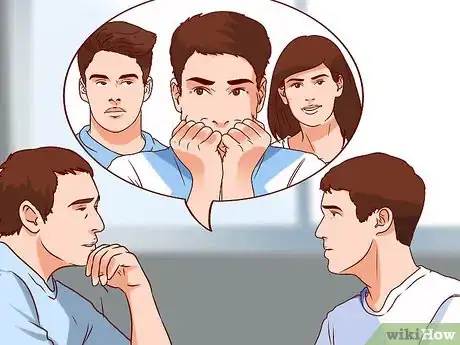









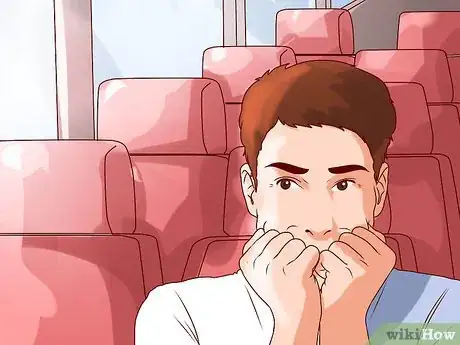


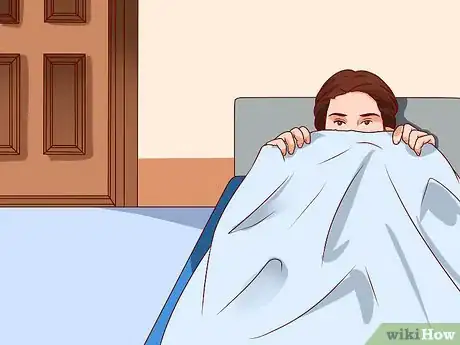
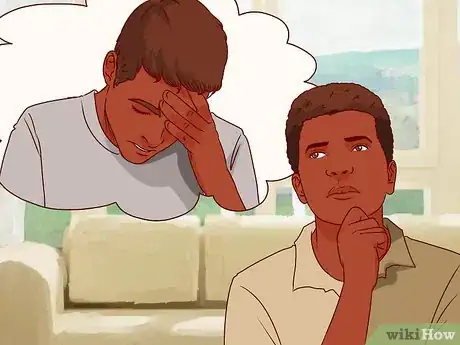
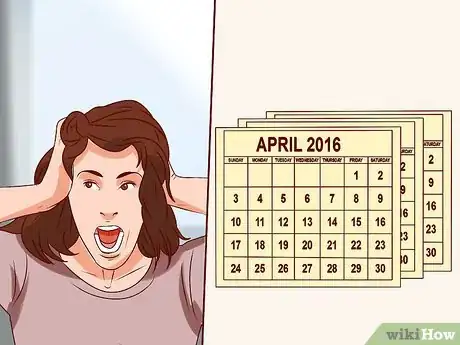
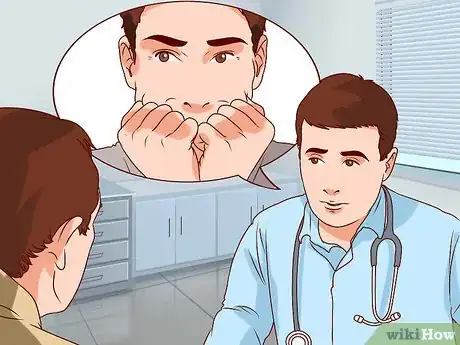







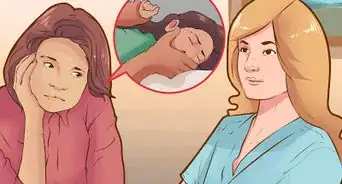




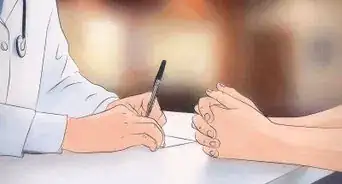
















































Medical Disclaimer
The content of this article is not intended to be a substitute for professional medical advice, examination, diagnosis, or treatment. You should always contact your doctor or other qualified healthcare professional before starting, changing, or stopping any kind of health treatment.
Read More...